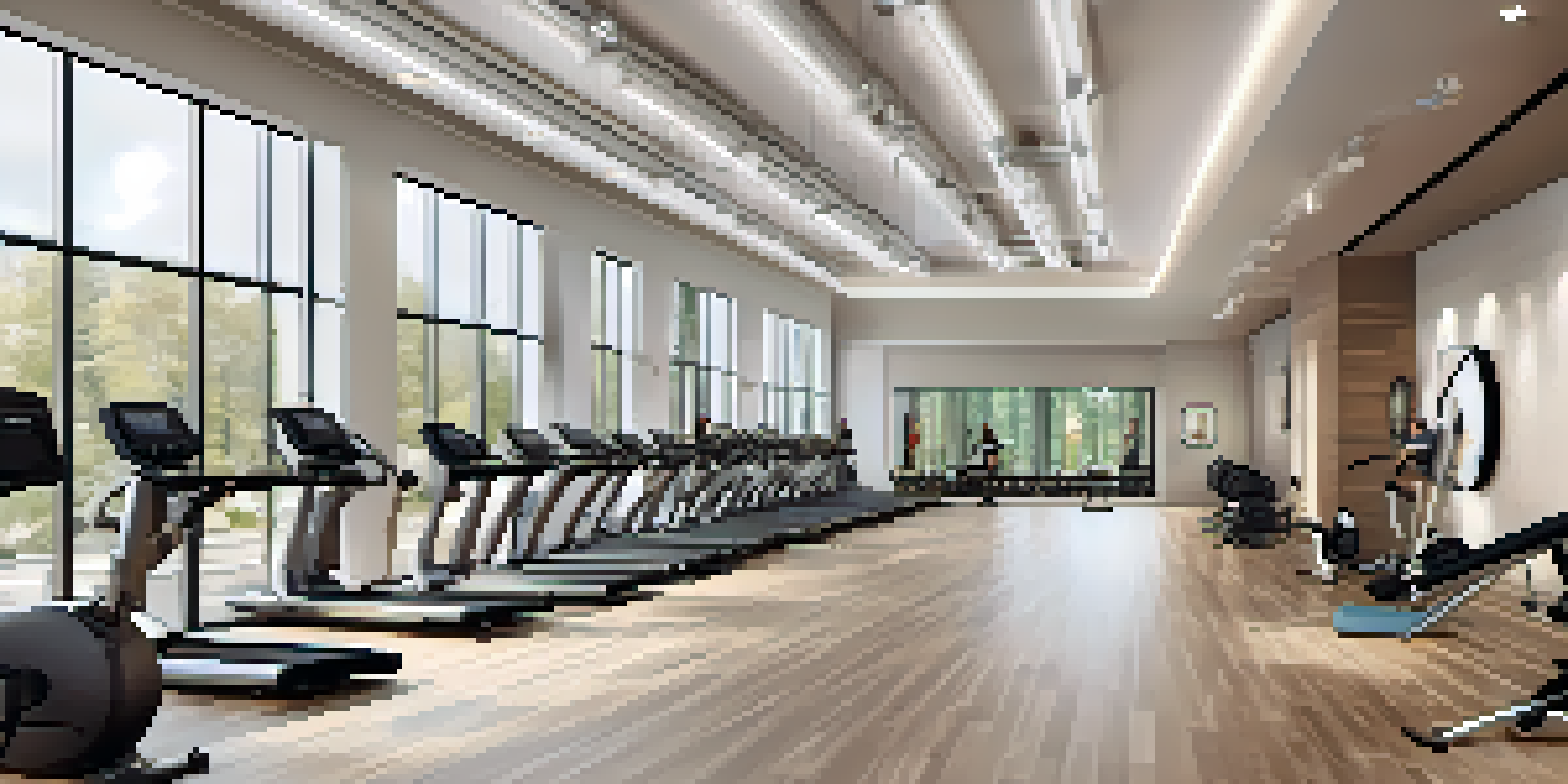The Evolution of Luxury Fitness: Past, Present, Future

The Origins of Luxury Fitness: A Historical Overview
Luxury fitness has deep roots, dating back to ancient civilizations where physical prowess was celebrated. In ancient Greece, for example, the gymnasiums served as centers for both physical training and social interaction, showcasing the importance of fitness in society. This early appreciation laid the groundwork for what we now recognize as luxury fitness, emphasizing not just physical health but also a lifestyle.
Fitness is not about being better than someone else. It's about being better than you used to be.
As the centuries progressed, fitness evolved, particularly during the Victorian era when physical culture gained popularity. The introduction of high-end fitness clubs and spas became a status symbol among the elite. This marked a shift where fitness was no longer just about health but also about affluence and exclusivity, setting the stage for modern luxury fitness establishments.
By the early 20th century, the concept of luxury fitness began to take shape more distinctly with the emergence of upscale gyms and fitness studios. The focus on personalized wellness, high-quality equipment, and exclusive memberships became a hallmark of what many would consider the luxury fitness experience today.
The Rise of Boutique Fitness Studios
In the early 2000s, boutique fitness studios emerged as a game-changer in the luxury fitness landscape. These intimate spaces offered specialized classes and a sense of community that traditional gyms lacked. This shift allowed fitness enthusiasts to engage in a more personalized experience, blending luxury with a focus on individual goals and social connection.

Popular concepts like SoulCycle and Barry's Bootcamp capitalized on this trend, combining high-energy workouts with luxurious amenities. The carefully curated atmosphere, from stylish decor to premium equipment, catered to a clientele that valued both fitness and aesthetics. This evolution underscored the idea that fitness could be both a rigorous pursuit and a lavish lifestyle choice.
Luxury Fitness Has Deep Roots
The concept of luxury fitness has historical roots, evolving from ancient civilizations that celebrated physical prowess to modern high-end gyms and boutique studios.
With the success of these boutique studios, larger gym chains began to adapt, incorporating similar elements into their offerings. The competition spurred an industry-wide transformation wherein luxury fitness became synonymous with exclusivity, personalized service, and a strong brand identity.
Technology's Role in Shaping Luxury Fitness Today
Today, technology plays a pivotal role in the luxury fitness experience. From high-tech workout equipment to personalized apps, fitness enthusiasts have access to tools that enhance their training. Smart wearables, for instance, track performance and health metrics, providing a level of customization previously unimaginable.
The greatest wealth is health.
Luxury fitness centers are now equipped with cutting-edge facilities, including virtual reality workouts and interactive classes. This integration of technology not only elevates the workout but also creates an engaging environment that attracts tech-savvy consumers. It’s a seamless blend of fitness and innovation that appeals to modern lifestyles.
Moreover, the pandemic accelerated the shift toward digital fitness solutions, leading luxury fitness brands to offer virtual classes and on-demand workouts. This evolution has expanded the reach of luxury fitness, allowing clients to enjoy premium services from the comfort of their homes, further blurring the lines between traditional gym experiences and home workouts.
Sustainability in Luxury Fitness: The New Frontier
As awareness of environmental issues grows, sustainability has become a key focus in luxury fitness. Many high-end gyms and studios are now incorporating eco-friendly practices, from using sustainable materials in their facilities to offering organic products in their cafes. This shift reflects a growing consumer demand for responsible and ethical choices.
Brands are also prioritizing wellness beyond just physical fitness, integrating mental and emotional health into their offerings. Many luxury fitness centers now feature wellness programs, meditation spaces, and holistic approaches to health. This comprehensive focus on well-being aligns with the values of a more environmentally conscious and health-oriented clientele.
Technology Enhances Fitness Experience
Today, luxury fitness leverages technology, from smart wearables to virtual classes, creating a personalized and engaging workout environment.
By embracing sustainability, luxury fitness brands are not only appealing to eco-conscious consumers but also setting a standard for the industry. This commitment enhances their brand identity and resonates with individuals looking to align their fitness journeys with their values.
The Impact of Social Media on Luxury Fitness Trends
Social media has profoundly influenced the luxury fitness landscape, shaping trends and consumer behavior. Platforms like Instagram and TikTok have transformed fitness influencers into powerful voices, often dictating what constitutes 'luxury' in the fitness realm. This has led to an increased focus on aesthetics, from fashionable workout gear to visually appealing workout spaces.
The rise of fitness challenges and online communities has fostered a sense of belonging among enthusiasts. Social media not only provides inspiration but also creates accountability, encouraging individuals to pursue their fitness goals while showcasing their progress. This interconnectedness has made luxury fitness more accessible, breaking down barriers to entry.
Moreover, luxury brands are leveraging social media as a marketing tool, creating aspirational content that resonates with their target audience. By showcasing exclusive experiences and high-end offerings, they cultivate a lifestyle image that attracts new clients and keeps existing members engaged.
Future Trends: What Lies Ahead for Luxury Fitness
As we look to the future, luxury fitness is likely to continue evolving in response to changing consumer demands. Personalization will remain at the forefront, with advancements in AI and data analytics enabling fitness brands to tailor experiences even more closely to individual needs. This shift will enhance the sense of exclusivity that luxury fitness embodies.
Furthermore, the integration of wellness and fitness is expected to deepen, with a greater emphasis on mental health and holistic well-being. Future luxury fitness centers may incorporate more wellness-related services, such as nutrition counseling and mindfulness programs, creating a comprehensive approach to health.
Sustainability Shapes Future Trends
A growing emphasis on sustainability is driving luxury fitness brands to adopt eco-friendly practices and holistic wellness approaches, aligning with consumer values.
Lastly, as the world becomes increasingly interconnected, luxury fitness brands may explore global collaborations and experiences. This could lead to unique offerings that combine fitness with travel, culture, and lifestyle, appealing to a clientele that values enriching experiences as much as physical health.
The Lasting Influence of Luxury Fitness on Well-Being
The evolution of luxury fitness reflects a broader cultural shift towards health and well-being. As fitness becomes more integrated into our daily lives, luxury fitness brands have played a crucial role in making it aspirational. By promoting an active lifestyle as an essential part of personal wellness, they have influenced societal perceptions of fitness.
Moreover, the emphasis on community within luxury fitness spaces fosters relationships and support networks among members. This sense of belonging not only enhances motivation but also contributes to overall mental well-being, showing that luxury fitness is about more than just aesthetics—it's about connection.

Ultimately, as luxury fitness continues to evolve, it will likely maintain its position as a leader in promoting health, wellness, and an enriched lifestyle. Its influence will persist, encouraging individuals to prioritize their well-being in a world that increasingly values health and self-care.